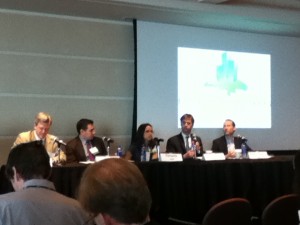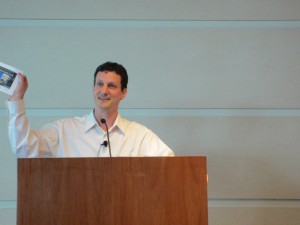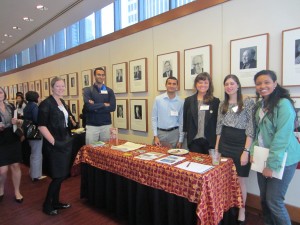A Young Ambassador’s Report from the 2012 Chicago Microfinance Conference
 I left the 2012 Chicago Microfinance Conference, “Micronext: Strategies and Challenges of Social Impact,” impressed, energized and hungry for more. The conference focused on the strategies and challenges of social impact, facilitating discussions around the direction of microfinance and the lessons from past methodologies. The strong turnout included experts from various microfinance organizations, as well as academics and folks who just wanted to understand microfinance better. I was there with seven other YAO members and YAO supporters, as well as six Opportunity staff members.
I left the 2012 Chicago Microfinance Conference, “Micronext: Strategies and Challenges of Social Impact,” impressed, energized and hungry for more. The conference focused on the strategies and challenges of social impact, facilitating discussions around the direction of microfinance and the lessons from past methodologies. The strong turnout included experts from various microfinance organizations, as well as academics and folks who just wanted to understand microfinance better. I was there with seven other YAO members and YAO supporters, as well as six Opportunity staff members.
The conference offered a chance to speak with microfinance experts in the U.S. and worldwide, offering a broad perspective on the methodologies that work best. Speakers tackled subjects like impact investing, measuring social performance, regulatory requirements, and the range of products available to microfinance institutions around the world. A common focus: the need to give people in poverty access to financial services–savings, insurance, agricultural and home improvement loans–rather than small business loans alone.
Two sessions interested me in particular…
 The session entitled Investments in Microfinance dealt with impact investing and its place within microfinance. Opening microfinance to investors excites me because it elevates the opportunity to get necessary financial services to people in poverty. The four speakers on this panel were Jacob Haar of Minlam Asset Management, Fernanda Lima of Developing World Markets, Christian Novak of TBC Capital Asset Management, Patrick Thomas Fisher of Creation Investments, and moderator Paul Christensen of Northwestern’s Kellogg School of Management. The speakers all shared their perspectives on impact investing through private equity or debt funding; and each one defined impact investing from his or her perspective and described a strategy to measure social performance. Impact investing goes well beyond the return on investment, providing a double bottom line. Measuring it, however, is difficult. You can measure social performance within impact investing in a number of ways, and I appreciated what each speaker found to be the most relevant. For example, Patrick Fisher emphasized access to and inclusion with financial services for people in poverty. Creation’s metrics include client- and job-creation volume, as well as the number of beneficiaries of financial services. I’d heard about impact investing prior to the conference, but learning from the experiences and perspectives of those involved proved to be invaluable.
The session entitled Investments in Microfinance dealt with impact investing and its place within microfinance. Opening microfinance to investors excites me because it elevates the opportunity to get necessary financial services to people in poverty. The four speakers on this panel were Jacob Haar of Minlam Asset Management, Fernanda Lima of Developing World Markets, Christian Novak of TBC Capital Asset Management, Patrick Thomas Fisher of Creation Investments, and moderator Paul Christensen of Northwestern’s Kellogg School of Management. The speakers all shared their perspectives on impact investing through private equity or debt funding; and each one defined impact investing from his or her perspective and described a strategy to measure social performance. Impact investing goes well beyond the return on investment, providing a double bottom line. Measuring it, however, is difficult. You can measure social performance within impact investing in a number of ways, and I appreciated what each speaker found to be the most relevant. For example, Patrick Fisher emphasized access to and inclusion with financial services for people in poverty. Creation’s metrics include client- and job-creation volume, as well as the number of beneficiaries of financial services. I’d heard about impact investing prior to the conference, but learning from the experiences and perspectives of those involved proved to be invaluable.
 The last session of the conference focused on David Roodman’s new book, Due Diligence: An Impertinent Inquiry into Microfinance. Roodman summarized his book by emphasizing the need to play to strengths within microfinance, and offered up the idea of “not reducing poverty, but building dynamic institutions to mass-produce useful services to the poor.” Rather than lending to the most impoverished individuals, Roodman supports offering a range of financial services to people within these communities to help them develop themselves. Roodman’s definition of poverty–not necessarily an absence, but a volatility, of income–struck me in particular. It led to a discussion around the various services that could help mitigate such volatility. I left wanting to read Roodman’s book, especially because he wrote it publicly: he posted each chapter on an open blog, soliciting public feedback along the way. The topics in his book facilitated an online discussion, and will continue at an upcoming YAO book discussion, co-hosted with Women Advancing Microfinance (WAM), in Chicago in June.
The last session of the conference focused on David Roodman’s new book, Due Diligence: An Impertinent Inquiry into Microfinance. Roodman summarized his book by emphasizing the need to play to strengths within microfinance, and offered up the idea of “not reducing poverty, but building dynamic institutions to mass-produce useful services to the poor.” Rather than lending to the most impoverished individuals, Roodman supports offering a range of financial services to people within these communities to help them develop themselves. Roodman’s definition of poverty–not necessarily an absence, but a volatility, of income–struck me in particular. It led to a discussion around the various services that could help mitigate such volatility. I left wanting to read Roodman’s book, especially because he wrote it publicly: he posted each chapter on an open blog, soliciting public feedback along the way. The topics in his book facilitated an online discussion, and will continue at an upcoming YAO book discussion, co-hosted with Women Advancing Microfinance (WAM), in Chicago in June.
I’m fairly new to YAO, so alongside a rich educational experience, the conference provided me a great networking opportunity. I connected with other professionals who share my passion to see businesses develop and thrive globally. It’s a start for me to connect with the microfinance community in Chicago, and I look forward to exploring more of these topics at upcoming events.
Meredith is a member of YAO-Chicago and worked abroad in microfinance for several years as an employee of HOPE International. She now works as a portfolio administrator at Promus Capital, LLC in Chicago.